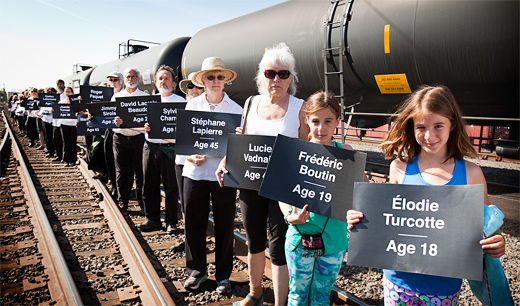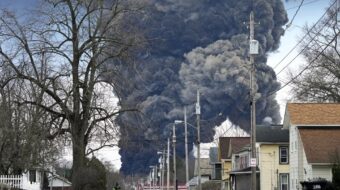
A vigil was held on June 6 in Portland, Maine, honoring the 47 people who lost their lives in the 2013 Lac-Megantic, Quebec oil train explosion. Held by 350.org and the Sierra Club, the event marked the two-year anniversary of the disaster, and served to raise concerns about train safety, especially its life-threatening and inexcusable use in transporting oil. Others took inspiration, and rallies against oil trains took place that same day in California, New York, and Oregon.
In addition to killing civilians, the infamous Lac-Megantic tragedy spilled about 26,000 gallons of crude into the nearby Claudiére River. The site was described as a “war zone” by Canadian Prime Minister Stephen Harper and drew attention to the dangers of oil transport on an international level. At the vigil, Lee Chisolm, head of the Sierra Club’s Greater Portland chapter, said, ” The disaster was inevitable. And like the train accelerating toward the unsuspecting town of Lac-Megantic, our exploitation of fossil fuels has itself continued to accelerate, notwithstanding that tragedy.”
In San Jose, California that same day, activists demonstrated with much the same sentiment. But at the core of their rally was the fight against a proposed oil refinery expansion in their area, which would turn the Union Pacific railroad that cuts through the heart of their town into a route for oil trains. The refinery is owned by Phillips 66, a Texas-based energy corporation, which wants to forge a connecting pathway so oil trains can deliver crude directly to their 1,800-acre processing facility. The opposition came in the form of residents and members of 350 Silicon Valley.
“We are calling for county planning officials to reject planning permission for projects that aim to transport crude oil by rail or pipeline,” said Palo Alto resident Steve Eittreim. “Tar sands need to stay in the ground. There is no safe way to transport them.”
Ash Kalra, a San Jose councilman, added, “Just look at the [local] rail lines. There’s no doubt that almost anywhere an explosion would occur in downtown or along neighborhoods in South San Jose would endanger hundreds, if not thousands, of lives.”
It was no coincidence that the California protest occurred on the same day as the Lac-Megantic vigil, and 350’s campaign to stop what it calls “Keystone on Rails” was careful to correlate the two. “In Lac-Megantic, Quebec, an oil train exploded killing 47 people,” they said in a statement. “Two years later, Big Oil is pushing harder than ever to move more and more oil trains through North America, while oil trains keep exploding and carbon emissions keep rising.”
Meanwhile in New York, nearly 100 people gathered in front of the Executive Mansion in Albany, the residence of Gov. Andrew Cuomo, to call for banning oil trains across the entire state. They hung photos of the Lac-Megantic victims on the mansion’s fence, while speakers pointed out the risks the trains pose to the communities through which they travel.
“Governor Cuomo, you have a moral imperative to take the climate seriously,” said Peter Iwanowicz, executive director of Environmental Advocates of New York. State officials, he added, should declare oil trains an “imminent hazard” and ban them.
Another oil train protest took place that day in Portland, Oregon. Sixty activists, including members of Portland Rising Tide, blocked the train tracks that led into an oil transfer and storage facility in the northwest part of the city, brandishing signs that read, “Oil Trains Fuel Climate Chaos,” and “Ban the Bomb Trains.” They also held signs bearing the names of those who died in the Lac-Megantic tragedy.
Local activist Lowen Berman remarked, “It’s corporate greed versus the common good, whether it’s rail safety or climate change.”
For Portland Rising Tide, the demonstration was merely one of many, with more to come. “This is only the beginning,” declared Noah Hochman, a representative of the group. “We will continue to blockade [oil train terminals] until it is financially, logistically, and politically untenable for oil trains to threaten climate and communities.”
Photo: In Portland, activists hold up signs with the names of those who died in the Lac-Megantic disaster. | Portland Rising Tide












Comments